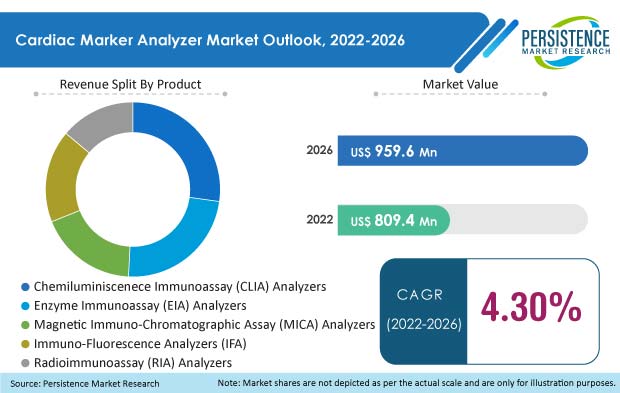Cardiac Marker Analyzer Market Segmented By Immuno-Fluorescence Analyzers, Magnetic Immuno-Chromatographic Assay Analyzers, Chemiluminiscenece Immunoassay Analyzers, Radioimmunoassay Analyzers, Enzyme Immunoassay Analyzers Product
Industry: Healthcare
Published Date: May-2022
Format: PPT*, PDF, EXCEL
Delivery Timelines: Contact Sales
Number of Pages: 189
Report ID: PMRREP3479
Cardiac Marker Analyzer Market witnessed a CAGR of 4.4% between 2013 and 2021. The global Cardiac Marker Analyzer Market is expected to witness a 4.3%CAGR between 2022 and 2026. In 2022, the global Cardiac Marker Analyzer Market size was US$ 809.4 million, which is projected to reach US$ 959.6 million by the year 2026.
| Attribute | Key Insights |
|---|---|
|
Cardiac Marker Analyzer Market Size (2022) |
US$ 809.4 Mn |
|
Projected Market Value (2026) |
US$ 959.6 Mn |
|
Global Market Growth Rate (2022-2026) |
4.3% CAGR |
|
Share in parent market |
3.4% |
Cardiac Marker Analyzer Market is expected to witness a CAGR of 4.3% during the forecast period between 2022 and 2026. The rise in cardiovascular diseases, rapidly changing lifestyle, and dietary patterns are contributing to the increase in demand for Cardiac Marker Analyzer. Furthermore, the growing pool of high-risk geriatric patients along with a steady demand for point-of-care diagnostic solutions is expected to drive the global Cardiac Marker Analyzer Market.
The need for reliable clinical testing has increased due to the growing prevalence of cardiovascular diseases such as angina pectoris, myocardial infraction, and others, which is contributing to significant growth of the Cardiac Marker Analyzer Market growth globally. The growing demand for Personalized Real-Time Treatment and Disease Management Regimens is expected to boost the Cardiac Marker Analyzer Market substantially throughout the forecast period. Furthermore, rapid technological advancements and rising healthcare expenditures, along with decreasing healthcare costs, are expected to benefit the global Cardiac Marker Analyzer Market significantly.

Globally, the geriatric population is growing. The growing geriatric population is also associated with increases in cardiovascular illnesses such as heart failure, myocardial infarction, and angina pectoris. The growing elderly population is projected to boost the cardiac marker analyzer market. Apart from the geriatric population, obesity has become a global health concern in the last several decades, with one out of every six people being fat. Obesity affects around 13% of the world's adult population. Obesity is linked to a variety of cardiovascular disorders, including congestive heart failure, angina pectoris, and myocardial infarction. The growing obesity rate, which puts people at a higher risk of developing cardiovascular ailments, is expected to drive up demand for cardiac marker analyzers.
The cardiac marker analyzer aids in the detection of many cardiovascular disorders, gives fast and real-time results, and is important in personalized treatment and disease management. Clinicians can limit the chance of unnecessary adverse events by using diagnostic information to make therapeutic recommendations. Many illnesses and ailments can be managed to utilize customized, real-time solutions. As medicines become more personalized, health information technology and integrated communication networks will make it possible to effectively channel patient diagnostic information to improve the timing and type of evidence-based health interventions. The significance of cardiac marker tests in the treatment of various cardiovascular diseases is expected to drive the growth of the cardiac marker analyzer market during the forecast period.
The high cost of Cardiac Marker Analyzers is the most significant impediment to market expansion in developing nations. The overall cost of treatment and surgeries for Cardio-vascular diseases is pricey, and is out of reach for several low and middle-class households in the developing nations.
“Decrease in demand due to lockdown”
The COVID-19 pandemic had a negative impact on the global economy, and it had a significant impact on the Cardiac Marker Analyzer Market. Due to strict lockdown, many cardiovascular surgeries were postponed and doctors shifted to telemedicine. Apart from this, due to stern regulations and disruptions in the supply chain activities, there was a decrease in the availability and sales of Cardiac Marker Analyzers around the world.
The Cardiac Marker Analyzer industry is very competitive and highly consolidated due to the presence of several large players. Key players in the market are focusing on mergers and acquisitions as the industry is in the growth phase. Companies are making strategic decisions to engage in mergers and acquisitions in order to expand their product portfolios and grow their market share.
| Attribute | Details |
|---|---|
|
Forecast Period |
2022-2026 |
|
Historical Data Available for |
2013-2021 |
|
Market Analysis |
US$ Mn/Bn for Value |
|
Key Regions Covered |
|
|
Key Countries Covered |
|
|
Key Market Segments Covered |
By Product |
|
Key Companies Profiled |
|
|
Customization & Pricing |
Available upon Request |
Cardiac Marker Analyzer Market by Product
Cardiac Marker Analyzer Market by Region
To know more about delivery timeline for this report Contact Sales

In 2022, the Cardiac Marker Analyzer Market stands at USD 809.4 million, and it is expected to reach USD 959.6 million by 2026 at a CAGR of 4.3%.
Cardiac Marker Analyzer Market exhibited a 4.4% CAGR between 2013 and 2021.
High equipment and treatment costs are the key restraints in the Cardiac Marker Analyzer Market.
An increase in the number of cardiovascular diseases, increased geriatric and obese population along with the increased demand need for Personalized Real-Time Treatment are the key factors driving the growth of the market.
Siemens AG, Radiometer Medical, Abbott Laboratories, and Quidel Corporation are among the top players in the market.